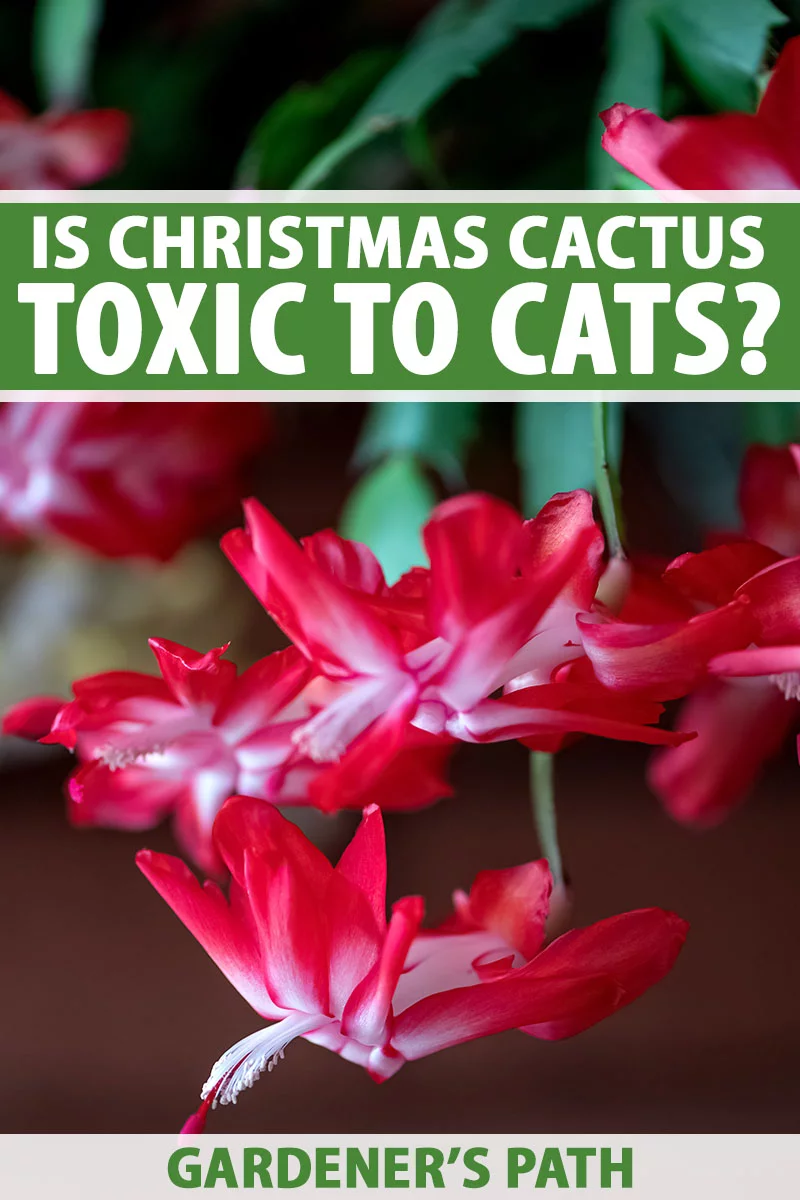Is Cactus Poisonous to Cats

Yes, cactus is poisonous to cats. The sap of the cactus plant contains toxins that can cause vomiting, diarrhea, and other health problems in cats. If your cat ingests any part of a cactus plant, it is important to seek veterinary care immediately.
COMMON TOXIC & PET-FRIENDLY HOUSEPLANTS TO CATS
There’s a lot of confusion out there about whether cactus is poisonous to cats. The answer is a little complicated, because it depends on the type of cactus. Some cacti are toxic to cats if ingested, while others are not.
The most common type of cactus that people have in their homes is the Christmas cactus. This plant is not poisonous to cats and is actually considered non-toxic by the ASPCA. However, it can cause stomach upset if your cat eats too much of it.
So if you have a Christmas cactus, make sure your kitty doesn’t nibble on it too much!
Other types of cacti that are poisonous to cats include the Easter lily cactus and the Peruvian apple cactus. These plants contain toxins that can cause serious health problems if ingested by your cat, including kidney failure and death.
If you have either of these plants in your home, keep them out of reach of your feline friend!
Are Succulents Poisonous to Cats
While succulents are not poisonous to cats, they can cause stomach upset if ingested. If you suspect your cat has eaten a succulent, contact your veterinarian immediately.
Are Easter Cactus Poisonous to Cats
If you have a cat, you may be wondering if Easter cactus is poisonous to them. The good news is that they are not! This type of cactus is actually safe for cats and other pets.
However, there are some things to keep in mind when it comes to this plant.
For starters, the Easter cactus does have sharp spines. While these aren’t poisonous, they can cause your cat pain if they’re pricked by them.
Additionally, the plant contains saponins, which can cause vomiting and diarrhea if ingested in large quantities.
Is Christmas Cactus Poisonous to Cats
No, Christmas cactus is not poisonous to cats. You may be wondering why your cat seems interested in this plant. The answer is simple: because it’s fun to eat!
The leaves and stems of the Christmas cactus are full of water, and they make a crunchy, satisfying snack for your kitty. Plus, the plant smells nice, so your cat can’t resist taking a little nibble.
If you’re worried about your cat eating too much of the plant, don’t be.
Christmas cactus is non-toxic to cats, so they can enjoy munching on it without any risk of illness. Just make sure to keep an eye on them so they don’t eat too much and make themselves sick. And if you want to keep your Christmas cactus looking its best, you might want to put it out of reach of curious kitties!
Cactus And Cats
Cactus and cats may not seem like they go together, but surprisingly, cactus make excellent housemates for cats! Cactus are low-maintenance plants that don’t require much water or care, making them the perfect plant for a household with a feline friend. Plus, their prickly exterior deters most cats from bothering them.
If you’re looking for a plant that can withstand your cat’s shenanigans, a cactus is a great option. Just be sure to choose a species that isn’t poisonous to kitties, like the Easter lily cactus. With a little bit of research, you can find the perfect cactus to keep in your home – and your cat will love it too!
Prickly Pear Cactus Cats
If you live in a hot, dry climate, you may be familiar with the prickly pear cactus. These unique plants are not only beautiful, but they’re also a great source of food for animals. And one animal that loves to eat prickly pears is the cat!
Prickly pear cactus cats are a type of domestic cat that has been specifically bred to have a diet that consists mostly of prickly pear cacti. These cats are native to arid regions of the world, and they have special adaptations that allow them to survive on very little water.
Prickly pear cactus cats are typically small in size, and they have short fur that is either gray or reddish-brown in color.
Their eyes are usually green or yellow, and their ears are relatively large in order to hear predators approaching from afar.
Prickly pear cactus cats are excellent climbers, and they use their sharp claws to climb up into the prickly pears to eat the fruit. They also consume the pads of the cactus, which contain high levels of moisture.
While most cats typically drink water on a daily basis, prickly pear cactus cats can go without it for long periods of time thanks to their ability to extract moisture from their food sources. However, it’s important to note that these cats should still have access to water at all times, as they can become dehydrated quickly if they don’t consume enough moisture.

Credit: www.aspca.org
What Cactus Plants are Poisonous to Cats?
There are a number of cactus plants that can be poisonous to cats if ingested. The most common of these is the Opuntia, or prickly pear, cactus. Other potentially harmful cacti include the Easter lily cactus, the Peruvian apple cactus, and the night blooming cereus.
All of these plants contain toxins that can cause gastrointestinal upset in cats, including vomiting and diarrhea. In severe cases, ingestion of these plants can lead to kidney failure.
If you have a cat that likes to nibble on plants, it’s important to do your research and make sure any cacti in your home are safe.
If you’re unsure whether a plant is poisonous or not, err on the side of caution and keep it out of reach of your feline friend.
What Happens If My Cat Eats a Cactus?
If your cat eats a cactus, it will most likely experience gastrointestinal distress. Symptoms may include vomiting, diarrhea, and lack of appetite. If your cat is showing any of these signs, contact your veterinarian immediately.
Cactus can also be sharp and prickly, so if you see any cuts or punctures on your cat’s body, bring them to the vet as well.
How Do I Protect My Cat from Cactus?
There are a few things you can do to protect your cat from cactus. First, make sure they have plenty of water available at all times. Cactus need a lot of water to survive, so if your cat is thirsty, they may be tempted to drink from a cactus.
Second, keep your cat away from areas where cacti are growing. If you have a cactus in your home, make sure it’s in a place where your cat can’t get to it. Finally, if your cat does come into contact with a cactus, immediately rinse the area with cool water and give them some soothing ointment for any discomfort.
Are Succulents Ok for Cats?
cats and succulents
While most cats will avoid eating plants, there are a small percentage that enjoy nibbling on them from time to time. If you have a cat that likes to chew on plants, succulents may not be the best choice since they can be toxic to cats if ingested.
However, if your cat doesn’t eat plants and you’re looking for a low-maintenance option, succulents can make a great addition to your home. Just be sure to keep them out of reach of your feline friend!
Can Cactus be Poisonous or Dangerous to Kids like it is to Cats?
Cactus toxicity and child safety are important considerations when it comes to keeping these prickly plants around kids. While cacti are generally safe if handled with care, certain varieties can pose a risk if ingested or if their spines come into contact with delicate skin. It’s crucial to educate children about the potential dangers and ensure that cacti are placed out of their reach, to avoid any mishaps or accidents.
Why Does My Cat Chew My Cactus?
There are a few reasons why your cat might be attracted to chewing on your cactus. The first is that cats have a natural instinct to chew on plants. This helps them to grind down their teeth and keep their mouths healthy.
Chewing on plants also allows cats to self- groom and consume essential nutrients like vitamins A and C.
Another reason why your cat might be drawn to chewing on your cactus is because it contains high levels of oxalate crystals. These crystals can actually help to clean your cat’s teeth and provide them with some much-needed minerals.
So, if you notice your cat regularly chewing on your cactus, there’s no need to worry! They’re just following their natural instincts and getting some benefits out of it too!
Conclusion
No, cactus is not poisonous to cats. In fact, it can be a healthy treat for your feline friend. Cats love the taste of cactus, and it’s a great source of vitamins and minerals.